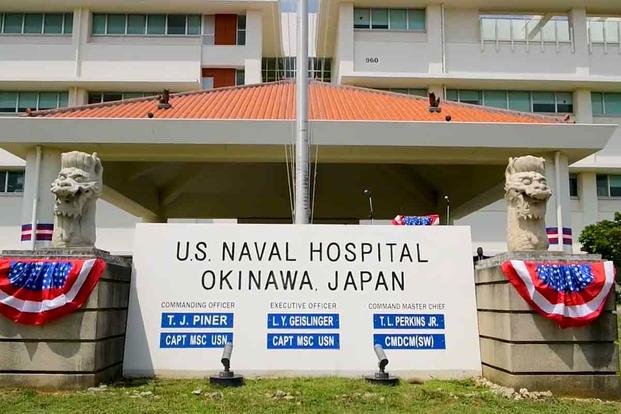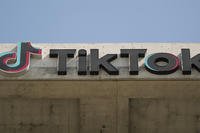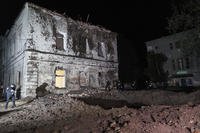Pregnant service members, spouses and dependents at Kadena Air Base on Okinawa, Japan, endured an emotional roller coaster last week when they were told to plan for delivering their babies at a facility other than Naval Hospital Okinawa -- a diversion prompted by severe staffing shortages at the medical facility.
While the Defense Health Agency quickly responded to the announcement from the 18th Medical Group at Kadena, saying the hospital was not diverting patients and deliveries would continue, the chaotic episode marked the second time in months that the U.S. military health system in Japan has faced challenges handling staffing and patient load.
On June 7, Air Force Lt. Col. Travis Russell, chief of staff at the 18th Medical Group, issued a memo notifying military beneficiaries who are scheduled to deliver a baby between August and November they would not be accepted at the Navy hospital and should choose a Japanese hospital or enter a program that would fly them to the continental U.S.
Read Next: Tuberville Offered Vote in Senate But Still Won't Drop Hold on Military Promotions
The "Stork Nesting" program, according to the memo, would give the unit the opportunity to provide "dedicated, safe obstetrics care for our pregnant patients in a facility that meets U.S. standards and guidelines."
The plan was to send expectant moms to the U.S. before 34 weeks of gestation, but travel for their "non-medical attendee" would not be authorized until four weeks before the delivery date.
"This may result in time away from family members and recovery in a hotel-type setting," Russell said.
The other option was delivery at a Japanese hospital where, Russell noted, care is on par with other developed nations.
However, there are a number of key differences between Japanese prenatal and birthing care and American health treatment that Russell spelled out in the memo, including that care is not guaranteed, as Japanese law does not require hospitals to accept patients in labor.
Other differences, Russell noted, include attitudes to epidurals, which rarely are used in Japanese childbirths, longer post-birth stays in hospitals, the language barrier and the fact that patients may be denied care if they are overweight or obese.
"This information is the best available evidence but please note individual experiences can certainly vary. We firmly believe in personalizing your care based on your specific needs and circumstance," Russell wrote.
The memo sent shockwaves through the military community on Okinawa, affecting not only Kadena residents but pregnant Navy and Marine Corps patients assigned to the hospital, who were left wondering whether the diversion would eventually affect them.
"We've been sounding the alarm bells for years now, saying there's not enough staffing. You are not going to be able to care for people," said Randi Wilson, a civilian Defense Department employee who advocates for military families and Defense Department civilians in Japan. "The Defense Health Agency keeps slipping it under the rug, saying things are fine."
The day after the memo was written, Defense Health Agency officials released a message saying that the hospital would continue to provide full labor and delivery services for all beneficiaries in the region.
"The hospital is NOT on divert and there is no change in current capability. Additional military, civilian, and contracted staffing is being actively worked to fill the gaps caused by personnel moves and to ensure the same level of care is readily available in support of our service members and families," officials wrote.
The Defense Health Agency did not respond to a request for more information about the staffing shortages, the professions that are vacant, or plans for building the staff.
In a June 8 message, DHA officials acknowledged the staffing constraints, saying they were "brought about by the summer permanent change of station cycle and unanticipated early departure of civilian staff."
"Through a collaborative effort on the part of DHA and the medical departments of all military services, Okinawa will continue to provide full labor and delivery services for all beneficiaries within the [U.S. Indo-Pacific Command] area of responsibility," they wrote.
To address the shortages, it appears that the Defense Department has launched an all-out recruiting effort to hire providers for Okinawa.
A text circulating online from a representative of Goldbelt Glacier Health Services, the company that manages Navy and Air Force contracts in Japan, announced an emergency need for labor and delivery nurses in Okinawa, offering a $15,000 signing bonus, relocation assistance of up to $70,000 round-trip, lodging and travel pay.
"We are offering relocation from anywhere for up to 120 days to fill these vacancies," wrote Jen Juliano, a program manager at Goldbelt Glacier.
Juliano did not respond to an interview request from Military.com.
Wilson said medical services on Okinawa have always been challenging for Americans assigned to the island, which lacks an emergency room capable of handling severe trauma cases.
Shortages in the hospital and its affiliated clinics became more pronounced, however, following the changeover of hospital administration from the military services to the Defense Health Agency, Wilson said.
The move was related to health care reforms that began nearly a decade ago to align the military medical commands to care for service personnel, while the DHA became responsible for the care of military family members and retirees.
In December, the DHA announced that it would treat Defense Department civilian employees in Japan on only a space-available basis, notifying longtime patients that they should plan to receive medical treatment from local providers if American military hospitals can't accommodate them.
"Beginning Jan. 1, all military treatment facilities within the Indo-Pacific will offer space-available care in family medicine, internal medicine, pediatrics, and gynecology when excess capacity exists after meeting federal statutes governing access to care for active-duty service members and Tricare Prime-enrolled patients," U.S. Forces Japan announced Dec. 23 on the unit's Facebook page.
In March, the DHA reversed course, announcing that civilians in the Indo-Pacific region could seek treatment for chronic conditions at base hospitals, but appointments for acute care would remain on a space-available basis.
Since at least 2013, the Department of Defense has been on a mission to bring down the rising cost of health care across the military. That year, it established the DHA, a single agency designed to handle administrative and training functions that existed in triplicate across Army, Navy and Air Force medical commands.
Early in the process, there was an effort to manage costs by bringing patients back into military hospitals and clinics, However, in 2017, Congress gave the Pentagon broad authority to reevaluate and potentially scale back its facilities, which, in turn, led to a shift toward sending civilian patients for care in the communities surrounding bases.
The cuts appear to be having an outsized impact on obstetrics and gynecology departments, at least for the Department of the Navy. In April 2022, providers at Camp Lejeune, North Carolina, reported that staffing shortages were delaying appointments and pushing patients to civilian medical facilities more than an hour away.
In one case, a Marine wife went 12 weeks without a prenatal appointment after moving to Camp Lejeune from Quantico, Virginia.
At Naval Hospital Bremerton, closure of labor and delivery negatively affected patients, including a service member who miscarried after spending eight hours in a waiting room at a civilian facility.
Sailors at the Pacific Northwest base reported challenges getting appointments, even those required prior to a deployment or permanent change of station move.
The issues of staffing shortages at military medical facilities have garnered the attention of members of Congress, including Sen. Elizabeth Warren, D-Mass., and Rep. Frank Pallone, D-N.J., who have sent letters to the Defense Department demanding fixes.
"Providing the best possible services to support service members and civilians deployed overseas enhances readiness, retention, and morale," Warren wrote in a letter in January.
Wilson said she doesn't understand why U.S. military hospitals in Japan should see any cuts, given the uncertainties surrounding care in the community and the importance of the mission in Japan.
"This is a huge readiness issue. As we're preparing for a possible fight with China over Taiwan, we can't handle a broken arm on our military bases," Wilson said.
-- Patricia Kime can be reached at Patricia.Kime@Military.com. Follow her on Twitter @patriciakime
Related: Plans for Hospital Closures as Part of Military Health System Reform Forging Ahead After Pause













